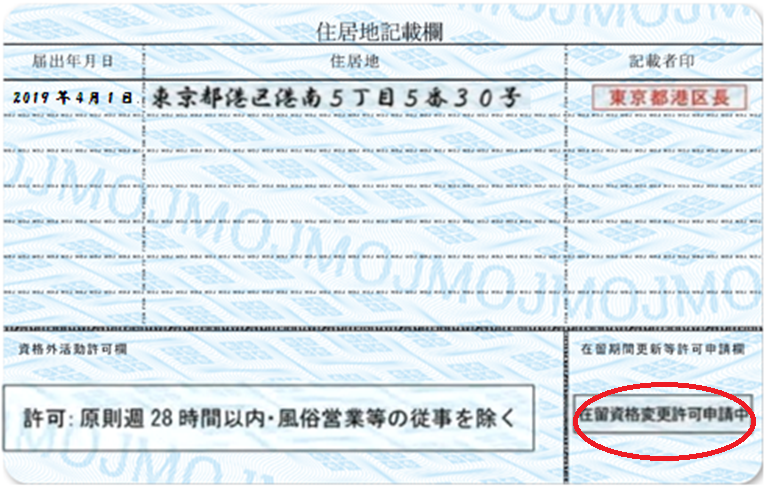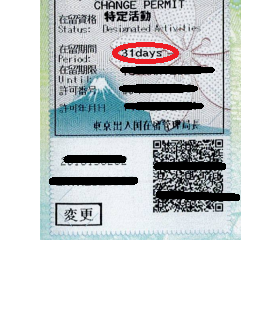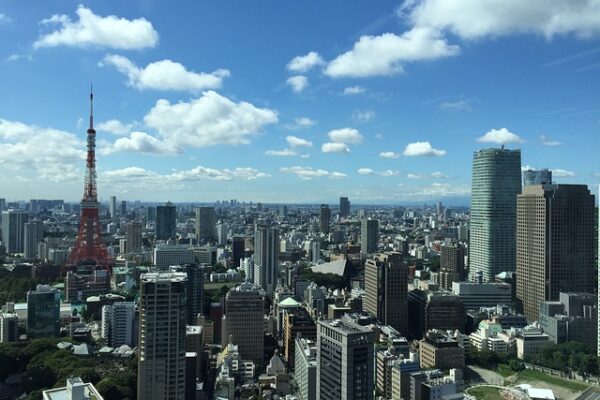When Your Residency Expires After Application

2024,03,03
03/03/2024
You might be concerned that if the result of your application for extension or change of status does not come out before your current stay period expires, you could be considered an overstayer. But the conclusion is, you won’t be deemed as overstaying.
Let me explain the system of the Special Period:
この記事を日本語で 申請中に在留期限を過ぎたとき
Special Period:
The Special Period allows individuals who have applied for an extension or change of status and haven’t received a decision before their current period of stay expires, to continue residing in Japan. They can stay until a decision is made or for up to two months after their stay period ends, whichever comes first.
If you apply in person at the immigration office, your residence card’s back will be stamped to indicate that your residence status is under application. If you apply online, please carry the completion email along with your residence card. If you require stamping on the back of your residence card or issuance of an application receipt for procedures like opening a bank account, please consult the local immigration office that accepted your online application.

Source of the photo: Immigration Bureau website
Cases where the Special Period does not apply:
The Special Period applies to individuals whose stay period exceeds 30 days. Therefore, it’s important to note that the Special Period does not apply to stay periods of 30 days or less (such as short-term stays).
Can you work during the Special Period?
Regarding working during the special period, it’s important to note that there are cases where you may continue to work and cases where you may not.
In cases where you can continue to work:
For instance, if you are already engaged in work under a work visa (such as the “Engineer/Humanities/International Services” residency status) and you are renewing your residency to continue working at the same company, you can continue to work during the special period.
In cases where you cannot continue to work:
In general, if you are applying for a change of status, you cannot continue working until after permission for the change in residency status has been granted. In these cases, regardless of the expiration of the residency period or any Special Periods, new activities cannot commence from the point at which the previous activities have ended.
Regarding permission for activities outside of one’s qualifications:
“The permission to engage in activities other than that permitted under the status of residence previously granted” obtained before the expiration of the residency period remains valid during the Special Period. Therefore, you can continue to engage in employment outside of your qualifications during this period.
However, please note that student part-time jobs, for which “The permission to engage in activities other than that permitted under the status of residence previously granted” is obtained, are only permitted while you are enrolled as a student. Hence, you cannot work part-time after graduation.
For Specified Skilled Workers (SSW) or Highly Skilled Professions, the employment location is specified and restricted by the “designated document” affixed to the passport. Even if the job responsibilities are the same, you cannot work at a different company until you receive a new residence card. Working before this change would constitute illegal employment.
If the application is denied
If a new application is denied, you will need to apply for a “Designated Activities” visa to prepare for departure.
For the application of this “Designated Activities” visa, a stay period of “31 days” or “30 days” will be granted. Remaining in Japan beyond this period would constitute illegal stay, so you must proceed with preparations to leave the country within the specified timeframe.
Difference between 31 days and 30 days

As explained earlier, the application of the “Special Period” is limited to individuals with a residency status exceeding 30 days (including visas such as “Short-Term Stay”). In other words, if you are granted a residency status of “31 days” is under the “Designated Activities” category, your reapplication will once again trigger the application of the “Special Period,” extending your maximum residency period by an additional two months.
On the other hand, if your residency period under the “Designated Activities” category is 30 days, the application of the “Special Period” will not be granted upon reapplication. Therefore, you must complete preparations for departure within this 30-day period.
When is it possible to apply for renewal?
If there are no changes to the activities and you are renewing your period of stay, you can apply for renewal from three months before the expiration date indicated on your residence card. Even if you apply three months in advance and receive approval before the expiration date, a new period will be granted from the expiration date. In other words, your period of stay will not be shortened, so it is recommended to prepare and apply well in advance.
Profile
Ami Ito
– Spent high school years in the U.K. and graduated from a local school.
– Studied mainly intercultural communication at Sophia University’s Faculty of Foreign Languages, English Department.
– Worked in the overseas department of SEIKO for 11 years after graduation.
– Over 10 years of experience teaching English to high school students, with a TOEIC score of 970 and a Class A level in the United Nations Associations Test of English.
– Serves as a director in charge of international affairs at the Chiba Administrative Scrivener Association.
– Officially registered on the Financial Services Agency’s “List of Professionals (Administrative Scriveners) in Chiba Prefecture capable of providing services in foreign languages.”
News and Blog








